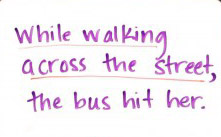When I was twelve, I killed a dog.
We lived in a rent house next door to Frank and Ethyl McMillen, a nice older couple who allowed our entire family (dad, mom, me, sister, two little brothers) to tromp into their living room every Monday at 8 p.m. to watch Gunsmoke on their nice big console television. The adults sat in chairs, Frank and Ethyl in their recliners, we kids on the floor–they had carpet– and sometimes Ethyl would serve us homemade cookies but only when my mom said okay.
McMillens had a dog named Penny. Her muzzle had started to turn gray and her black-and-white body had taken on some extra weight. Little terriers like that don’t handle extra weight very well. She walked like a sausage with legs. We weren’t encouraged to pet Penny. She moved stiffly and had her own ideas about company. But she never growled or scared us.
Each day I walked to school down a long gravel alleyway that ran from beside our house (and McMillen’s house) due west to the end of the block. The route then took me across railroad tracks, then alongside the athletic field and into the north wing of Will Rogers Elementary where I attended sixth grade. When school was over, I walked home.
One day as I returned home, I heard kids shouting and screaming. I spotted a group of kids jumping around on the far side of McMillen’s house, so I ran over there. At least six kids of various ages had gathered around the flower bed where Penny and another dog were in a fight. Only Penny wasn’t fighting. The other dog, a brown boxer more than twice her size, had her by the throat and pinned down.
One little girl screamed, “He’s going to kill her.”
I saw that was true. I ran around and knocked on the McMillen’s door, but I already knew they weren’t home. I looked around for a weapon—a shovel, a stick—something I could use to pry the dogs apart. I considered reaching down to pull the boxer off Penny, but then I worried the boxer would attack me. I thought of calling for help, but everyone there had been yelling and no one had come.
I was the oldest kid there, a head taller than anyone else. Someone had to do something, and the task fell to me. I couldn’t stand there and watch Penny be killed.
So I kicked the boxer. In the head. With my saddle oxfords, big heavy shoes I had to wear with specially-made arch supports inside so I wouldn’t get fallen arches. My feet in those shoes dangled from the end of my legs like concrete blocks. It wasn’t without some serious clout that I aimed and fired with the toe of those shoes.
The boxer didn’t budge. In retrospect, I suspect my assault may have only intensified his determination. I kicked his head, careful not to also hit Penny. She had collapsed by now, resting against the red brick wall of the house and the well-tilled soil of Ethyl McMillen’s rose garden.
I kicked again and again, each time terrified I’d miss and hit Penny or that the boxer would turn and sink his teeth into my leg.
Why didn’t he let go? Why didn’t somebody come, a grown-up, someone who would know what to do? My heart pounded. Sweat poured off me. I was shaking all over.
Finally the boxer let go. Penny didn’t move. The boxer trotted away. The kids dispersed. I went home.
Two or three hours later, my dad stood outside talking to a man. My dad came back inside and asked me if I knew what I’d done. I told him what happened. He shook his head.
“That man,” he said, gesturing. “He came down here to tell me that his kids’ dog just died. In their bathtub, bleeding from his nose and ears. He said you kicked him to death.”
I stood there as all the feeling drained out of my head and chest. I couldn’t breathe. I had killed a dog. It wasn’t that my dad lectured me or seemed angry with me. He seemed bemused, unsure what to think that his oldest child had done such a thing.
The man had told him they paid fifty dollars for that dog. Did my dad have to pay him for the dog? I don’t know.
I don’t remember if my dad said I’d done something wrong. But I felt terrible anyway. No one hugged me and said they understood, that everything would be okay. No one seemed to recognize the trauma of my experience.
I think I cried later, after my sister in the twin bed next to me had gone to sleep, when no one would see or hear me.
I didn’t mean to kill a dog. I was trying to save a dog. Surely everyone understood that. Who else had any idea of what else I could have done? What anyone could have done? But it was my fault their dog died and they were mad.
Penny died, too. She would have died even if I hadn’t killed the boxer with my big heavy oxfords. My right foot.
It was their fault the boxer died, not mine. I understand this now. They had a dog who for no apparent reason invaded Penny’s home turf and attacked her. A dog like that shouldn’t have been allowed to roam loose, but in those days, leash laws didn’t exist. For all I know, the boxer may have killed other dogs in that neighborhood.
At the time, I knew none of that. I only knew that I had kicked a dog to death and its owners were mad at me and my dad was uneasy with the whole thing. I think the McMillens thanked me, but I don’t remember that part.
I remember the deep red of the brick, the soft sun-warmed dirt, the rose bushes and the big evergreen at the corner of the house. I remember the agitated neighborhood kids jumping around, yelling. I remember that boxer straddled over Penny as her big dark eyes bulged, her mouth gaping while the boxer kept his jaws firmly fastened over her throat. I remember the impact in my body of each kick, of holding myself steady for yet another carefully aimed blow to the boxer’s head.
I remember the impact of my foot against that dog’s skull. It traveled up my leg, through my hip, up my spine, and lodged in my head where memories stay forever.










